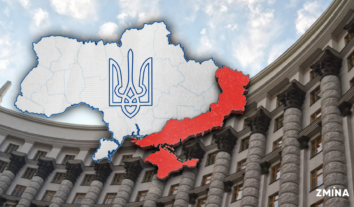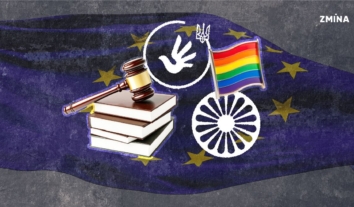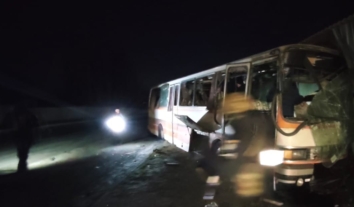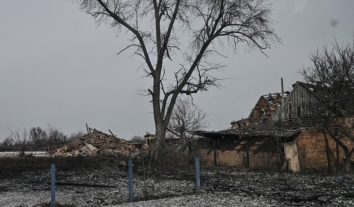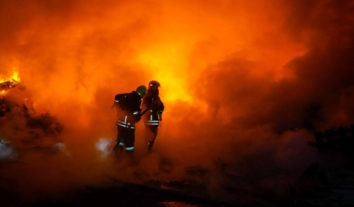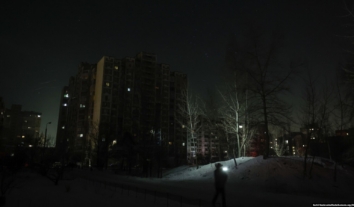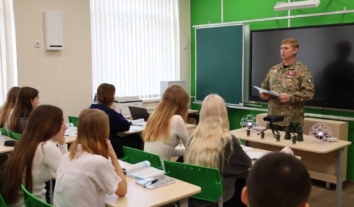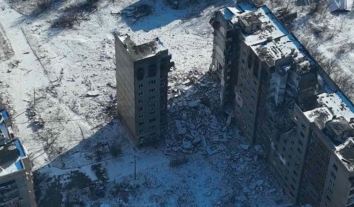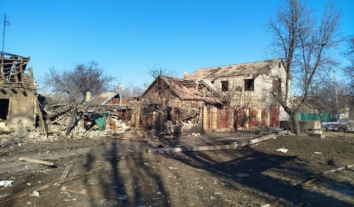“Students who are bullied tend to stop studying or not get an education at all”: human rights defender Maryna Shevtsova on the situation of LGBTIQ children in schools
LGBTIQ teenagers studying in Ukrainian schools face numerous challenges, from rejection and mockery to psychological pressure and physical violence. Ignoring their needs and devaluing them, which is often disguised by words like “you’ll grow out of it”, only increases their isolation and fear. In this situation, there is a need to find modern solutions to create a safe and inclusive environment.
ZMINA talked to Maryna Shevtsova, a senior researcher at the Catholic University of Leuven in Belgium, executive director and co-founder of the Equal Opportunities Platform and co-author of the course “School for All: Safe School Environment”. The problems faced by LGBTIQ students, modern approaches to solving them, examples of successful initiatives, and the role of schools, parents, and the state in supporting these children are discussed in the material.

What are the main problems faced by LGBTIQ students in educational institutions?
In 2017, the NGO Fulcrum conducted the first study of the school environment in Ukraine, measuring the sense of psychological well-being of children and teenagers who identify themselves as LGBTIQ+ in Ukrainian schools. About 700 children took part in the survey. In 2020, during the covid pandemic, the TERGO parents initiative, where I worked as a programme manager, conducted an almost identical study, slightly adapting the questionnaire. Last year, in 2023, we – TERGO and the NGO Equal Opportunities Platform – conducted such a study again to see what was happening to such children both in Ukrainian schools and abroad. In the latter case, we are talking about children who were forced to leave the country with their parents after the start of the full-scale invasion.
Of course, we cannot fully compare these three waves of the survey, in particular because we adapted the questionnaire to the situation each time, for example, in 2020 we asked teenagers about how they were coping with the pandemic when they switched to online learning and spent all their time with their parents at home. Last year, we were also interested in the impact of a full-scale invasion, children’s adaptation in other countries, etc. However, if we talk about the overall situation with psychological comfort, safety and harassment or bullying of LGBTIQ children and teenagers, unfortunately, there have been no radical changes for the better during these six years between the three waves of the study.
To briefly summarise the results of this survey, LGBTIQ teenagers face physical and sexualised violence both in Ukraine and abroad. It can also include hate speech, insults, homophobic and transphobic statements from school administrators, teachers, peers, etc. It should also be noted that not all LGBTIQ children at school are open for obvious reasons.
We have a question in our questionnaire: “Do you face bullying because of your weight, appearance, language or economic status of your family, etc?”. So, in general, LGBTIQ teenagers not only face bullying on the basis of SOGI (sexual orientation and gender identity), as they are a vulnerable group among other peers, but also suffer from bullying on other grounds, like other students who are different from the majority, a kind of conditional “norm”.
That is, a child may not talk about or even be aware of their sexual orientation or gender identity, or they may not identify with the LGBTIQ community at all, but because a girl has, for example, pink hair or does not look feminine enough, someone may assume she is a lesbian and start bullying her because of this. And even if she is not a lesbian, it still falls under the same category.
In addition, LGBTIQ children may also try to look hetero-normative, to fit into some kind of framework. We always have open-ended questions at the end of the questionnaire, and the most painful and interesting comments are always there. Many people write that they will never make a coming out in their school because they often hear some phrases from their peers, teachers, and school administrators that it is a disease and a perversion.
But every time I am shocked in a negative way by the fact that quite a few children (over 60%) say that they do not have any adult responsible person – either at school or outside of school – with whom they can share what is happening to them. This is a very frightening statistic.
Thank you a lot for such a detailed answer and for this incredibly important information. You’ve led logically to my next question. You’ve talked a lot about the role of school staff, teachers, and administrators in the issue of bullying, so what can a school do to create a good, comfortable, inclusive, accessible environment for everyone?
Yes, there is a certain triangle: parents, teachers/school administrators and children. When we work with teachers, they often complain that parents seem to shift a lot of responsibility for education onto the school. However, if we are talking about creating psychological comfort and safety at school, the lion’s share of responsibility lies with the school administration and teachers.
And, of course, the first thing a school should do in this direction is to create a clear anti-bullying policy or policy on preventing and counteracting bullying. This is a formal but important step, and it is required by Ukrainian law. Many schools actually have such policies in place, but they often do not take into account or mention factors such as sexual orientation or gender identity. It is clear that these topics are still considered provocative, but in my opinion, this should not stop school administrators, as it is simply an additional reason to hold information events and raise awareness among teachers and parents on this topic.
It would be perfect if teachers, children and parents were involved in the development of such policies. It is clear that this is an official document, and the responsibility for the drafting still lies with the school administration, but it would be good if everyone was involved in the process and understood why the policy is needed at all.
And one more thing: we always try to convey to teachers and parents that everyone suffers from bullying – the child who is bullied, the child who bullies, and the child who watches. It is a traumatic moment for everyone.
The second point is access to resources that are often not available in schools. This means holding educational or informational events with teachers, educators and administrators. Such trainings, for example, were conducted by the TERGO parents initiative. They are basic, because most teachers, unfortunately, still have biases, stereotypes and know little about LGBTIQ people – just like many other Ukrainians, this is not a peculiarity of teachers, of course.
So the trainings provide some basic information about how it works, how children become aware of their sexual orientation and gender identity. Experts explain that this can happen very early, even in kindergarten, and it is not a fad or something that a child can later outgrow. Indeed, sometimes it can have elements of experimentation, search for one’s own identity, but very often they do not “outgrow” it, and it is important in any situation to take seriously and respectfully what the child feels about themselves, how they experience it.
But there is another important point here: we had two different experiences with such trainings. In the first case, we took teachers from the region, from different schools. And when the training was over, many of them said: “This is great, I’ve changed my mind, but I’m going back to my school now, and it will be very difficult for me to convince the staff of how to do things”. So we changed the practice to one borrowed from the UK. It is called the “whole school approach”, when the training is conducted in the school with the school staff itself. Of course, it is not often possible for everyone to attend the training, but it would be great if the administration, psychologists, and teachers were involved. This creates a comprehensive approach and can lead to significant changes. And, again, when teachers see that the principal is interested in this and conveys these values, they are more likely to adopt this style of communication, behaviour and attitude.
And the third is awareness-raising activities. That is, the usual work with parents, because children come to school and bring what they hear at home. Especially if we’re talking about younger children, when their parents are authoritative figures. For example, if a parent watched the news about the Equality March on TV and heard comments, “again these gays”, the child comes to school and talks about it during the break.
Working with parents is an additional burden, it is some kind of information sessions at parent meetings. I understand that teachers are already working in very, very difficult conditions. But I’m talking about how it should be if it were in an ideal world. Again, many LGBTIQ organisations are ready to help with this and come and talk to parents, to do some informative meetings. I understand that it is very difficult to convince schools that right now, for example, they need to hold an online parental meeting where an LGBT activist will come and talk about why tolerance is important. Although I am sure there are schools that will agree to this. But yes, it is a challenge.
What resources or programmes would you recommend for schools to work with LGBTIQ children?
I would like to point out that a two-day offline, real-life training conducted by a relevant organisation is, in my opinion, the ideal option. The best practices that we have applied in such trainings have been supported by the Ministry of Education and have always had very good feedback from teachers and schools.
We also conducted such trainings online, although the format was slightly changed. It is clear that a person cannot stay in Zoom or Teams for a long time, where there is no opportunity for movement, informal communication, coffee and cakes. But this was also a good option during the COVID-19 pandemic.
There is another option that does not require additional resources. In 2020, on the platform of the Open University of Maidan, we created a course that lasts about an hour and consists of five or six lessons, each lasting about 10 minutes. The course can be completed independently at your own pace, free of charge, and you will receive a certificate at the end.
Of course, not all schools can recognise these certificates, but in terms of information, this course provides an excellent basis. It covers topics such as gender identity and sexual orientation, working with teenagers and their parents, and creating a safe and comfortable school environment. There are also additional reading and viewing materials, as well as helpful films.
When the course first appeared, more than 2,000 people took it. Although it is not as actively advertised now, the resource is still available, and it is a good option for those who want to get basic information without a deep dive.
There is also now some literature, brochures and online materials developed by the organisations Fulcrum, TERGO and Insight. They also help teachers and parents understand how to communicate with and support LGBTIQ teenagers.
Despite this, there are still not enough resources, especially in comparison to the English-language segment, where many materials exist for schools with instructions on how to teach lessons and communicate with children. We still have a lot to develop.
By the way, there is also an online course of the Ministry of Education on anti-bullying developed by gender activist Anastasiia Melnychenko. There is also a lesson dedicated to teenagers, which includes the topic of LGBTIQ. So, if you want, you can find information, but you need to make a little effort. It’s not that difficult.
Thank you for the answer, I agree – the information is really available and important to study. And how can or should school administrators respond to cases of bullying against LGBTIQ children?
This should be a comprehensive approach, taking into account the sensitivity of the situation. It is important to work together with parents, but it is categorically unacceptable to do an outing (public disclosure of information about a person’s sexual orientation or gender identity without their permission) of a child in front of them without their consent. First, you need to talk to the child and understand the situation at home. Parents may not be aware of their child’s orientation and may not be ready to accept it. In some cases, parents may react aggressively, choosing violence as a way of interaction, which can also lead to serious consequences.
In particular, there are cases where parents use physical or psychological violence or even threaten to deprive their child of financial resources. For example, one boy told us that his parents threatened not to pay his university contract if he did not “change his orientation”. We also know of cases of exorcism, when a child was dragged to a church and doused with cold water.
Such situations are dangerous and the school should act with caution. It is not acceptable to call parents to the school and tell them about their child’s orientation if they do not know. This can cause even more problems. The work should be comprehensive, including the involvement of the school administration, class teacher, psychologist, and, if possible, parents. It is important to consider whether the school has the resources for such work and how ready parents are to communicate.
It is necessary to work not only with the child who is being bullied, but also with the classroom where it is happening. It is important to identify the leader who may be the initiator of the bullying and to review the psychological climate in the classroom. After all, children often feel that the teacher allows such behaviour.
If bullying is openly taking place in the classroom, it means that children feel that they are allowed to behave in this way. Teachers may not express their attitude openly, but children have a good understanding of what is and is not allowed. It is important to notice the problem in time to prevent it from escalating.
In April, I was in Chisinau to attend a conference on LGBTIQ teenagers. It was held in honour of a child who committed suicide because of bullying at school. This is not the only such tragedy, and such cases occur not only far abroad, but also in neighbouring countries.
Unfortunately, the situation with bullying of LGBTIQ children is very similar in different countries, including the United States, the United Kingdom, Germany, etc. Some schools do more to protect these children, others less, but the problem remains global.
In this case, what changes in the curriculum can help create a more accessible and safe environment for all children? In this context, I was thinking about sex education, but I recall that we often get comments under the news like “why do we need sex education, it’s better to introduce Christian ethics lessons”.
This is indeed a very complex issue that requires a careful approach, because we are a democratic country, and it is important to respect both Christian ethics and sexual education. School administrations have a key role to play in protecting the rights of LGBTIQ children and ensuring a safe and supportive environment for all students.
When it comes to changes in school education, of course, I agree with what you said: the first priority should be sexual education – normal, comprehensive, taking into account different sexual orientations, gender identities, not stigmatising sexual relations before marriage, also talking about female pleasure, explaining everything clearly.
I would like to see comprehensive sex education, and it should start with the institutions that train educators, because there is a demand for it. When Cedos (an independent think tank and community that has been working on social development issues since 2010. The full name of the legal entity is the NGO Centre for Society Research) conducted research on sex education a few years ago, it turned out that there was a high demand from educators for this knowledge. Every time I come back to this study, I am impressed by the figures that show the need for additional education for both teachers and parents. Schools often choose a biology teacher or a class teacher to conduct such classes, but this is not always effective.
For example, in Germany there is a wonderful initiative called Erklärungsprojekt. It works without the participation of teachers, it is a non-profit organisation supported by the state and local administration. Volunteers of this organisation come to schools and conduct classes with children. The idea is that there is no teacher figure in the classroom to add authority and create some pressure. Instead, there are young people aged 25-30 who are closer to teenagers and can freely discuss sensitive issues.
Of course, all volunteers undergo special education and training, which allows them to communicate with children on an equal footing, without creating an atmosphere of pressure. This relieves teachers and creates a more comfortable environment for teenagers, where they can talk openly about topics that are important to them. These are not long sessions, but they are very effective. It would be great if something like this existed in Ukraine.
In our trainings for teachers, we always use the “living book” method, when one or two LGBTIQ people come to us and talk to teachers for two hours. This gives teachers the opportunity to ask about anything they are interested in. Sometimes there are some questions about personal relationships, for example, who you live with, how you divide household responsibilities, but usually they also ask about how these people survived their school years, what kind of relationship they had with their parents, what helped them accept themselves.
Such communication is important because people do not see an abstract image of an LGBTIQ person, but a real person with feelings. This promotes empathy, because it is difficult to hate someone whose problems and life you already know about. Unfortunately, in our research, we do not yet see a noticeable trend towards improving tolerance in the school environment, but the situation is complicated due to different conditions and the impact of war, internal displacement, a large number of refugees, etc.
However, all the surveys show that even one supportive person at school – not necessarily a teacher, but a psychologist, coach or methodologist – can significantly improve a child’s well-being. Children who know that they can turn to someone for support feel more psychologically comfortable and have a greater desire to continue their studies. This is important because children who face bullying often want to finish their education as soon as possible, leave school after grade 9, or not get an education at all because of the unbearable conditions in the school.
At the same time, university is a surprising discovery for many LGBTIQ people, as the situation there is often better than at school. However, to get in, you need to do relatively well in your studies, and this requires psychological resources. If all the resources are spent on staying safe at home and school, hiding your sexual orientation and protecting yourself from bullying, there is little chance of getting into university.
I would like to return to what we talked about at the beginning, the “triangle” – students, school, school administration and parents. What role do parents play in supporting LGBTIQ children during their education?
Parents are a superpower for their children. If a child is lucky enough to have supportive parents, it significantly increases the chances of successful graduation from school and that everything will be fine in their life in the future.
First, parents can choose a new school if there are problems at the previous one. For example, if the principal or class teacher showed discriminatory attitudes, said that LGBTIQ people should be “sent to Siberia” or “treated from perversion”, etc.
From my experience, I see that in recent years, children do coming out earlier, and parents are becoming more prepared to accept this fact. They are increasingly looking for ways to support their child, rather than trying to “fix” or “cure” them. For example, if a family has a transgender child, the school may be willing to meet the child’s needs by using the official name in documents and the name the child requests in class. This is, of course, an ideal scenario, and in reality, this practice remains more of an exception.
Parents often have to change several schools before they find one where the administration agrees to create comfortable conditions for their child. This really requires a lot of effort, because the system is not yet ready for such changes.
In addition, parents can actively participate in parent-teacher conferences, talk to teachers and psychologists, provide useful materials and resources, and contribute to a greater understanding of the situation at school.
Another important step can be publicly expressing one’s position, but this is already a top-level step. In Ukraine, as in many other countries, the voices of LGBTIQ military personnel and parents of LGBTIQ children have become powerful advocacy tools. The figure of the mother carries a lot of weight in Ukrainian society. When a mother speaks about her son or daughter facing discrimination, it resonates. People begin to treat the situation with more empathy, because it happens to people like themselves.
Of course, this is a difficult path that can lead to hate and accusations of propaganda, but we need to start at home, then work with schools, and then go into public space.
Thank you, the support of parents is really very important and valuable, because everything really starts with the family. In the end, I had the following question: what should the state do to protect LGBTIQ children?
We already have some legislation on anti-bullying – the Law of Ukraine No. 8584 “On Amendments to Some Legislative Acts of Ukraine on Countering Bullying” – but it does not address aspects such as sexual orientation and gender identity. It would be good if this changed. The state, and specifically the Ministry of Education, could support such anti-discrimination initiatives more with resources, both financially and at the level of rhetoric.
In particular, the Ministry of Education should clearly express its support for LGBTIQ children. For example, TERGO once received a letter of support from the Ministry of Education to conduct trainings on creating a safe environment in schools. Methodological guidelines for working with students and teachers were also approved. All this is happening, although often under the radar, because the topic remains sensitive.
I believe that the state must clearly state that the rights of all people, including LGBTIQ people, must be protected. School should be a place where a child feels safe and can realise their potential. If a child is depressed, what kind of education can we talk about?
The position of state authorities should be open and clear, based on universal human rights, and should not conflict with other values, such as religious ones. Resources should be directed, among other things, to support LGBTIQ children in schools to ensure that their education is of high quality and safe. Today, all these trainings are funded by Western donors who support our NGOs. However, this has its drawbacks, as for some people it may look like Western propaganda, as if the West is imposing its values on us. Therefore, support should come from the state, from the state budget. It could be the same sex education classes, the purchase of educational materials, etc. I understand that this can be a sensitive topic – what our money is being spent on? But that is why we need a clear position.
We cannot act as if we are doing something in secret. We should openly declare that we respect human rights, our children have the right to a quality education, and their sexual health is important to us. And we do this not against the church or the rights of believers, but for the sake of health, both psychological and physical.
The material was created with the support of Gender Stream in cooperation with the Center for Disaster Philanthropy. The views expressed within the project do not necessarily reflect the views of these organisations.


